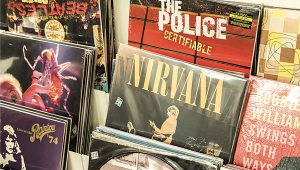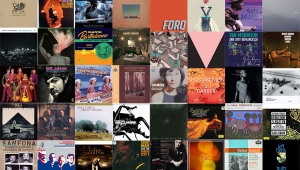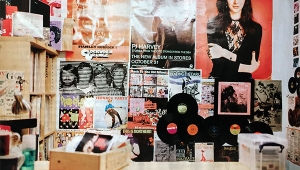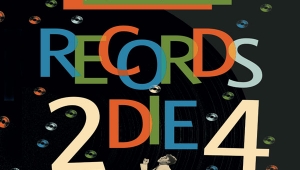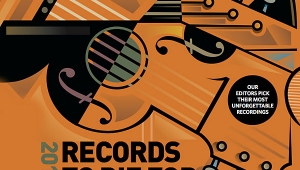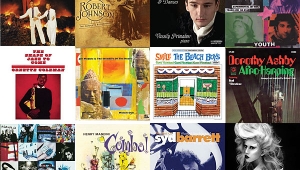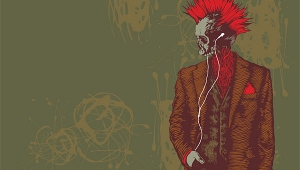| Columns Retired Columns & Blogs |
2007 Records To Die For
This year marks the tenth time I've written an introduction to Stereophile's venerable annual feature "Records To Die For." Looking back, I'm proud that readers always find it useful and entertaining. I'm also amazed, on some levels, that our writers—hardware or software, deadline-phobic or not—manage to find something worthwhile to say, year in and year out, about music—which, after all, is why we became audiophiles in the first place.
JEFF BUCKLEY: Grace
Columbia CK 57538 (CD). 1994. Andy Wallace, prod., eng., mix. AAD. TT: 51:48
FEAR: The Record
Slash/Rhino R2 79941 (CD). 1982/2000. Gary Lubow and FEAR, prods.; Gary Lubow and Bruce Barris, engs. Mastered for CD by Eddy Schreyer and Future Disk. AAD?. TT: 31:40
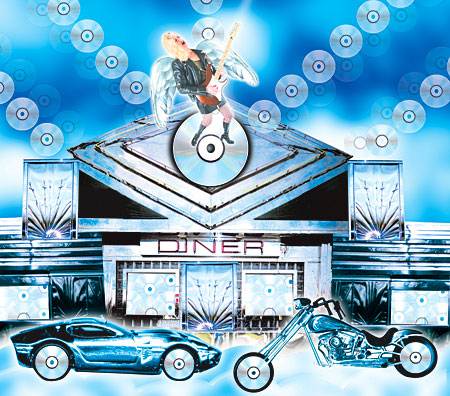
And last, farfetched as it sounds, it seems as if "R2D4" has actually had an effect on bringing several out-of-print titles back into circulation. David Patrick Stearns informs me that he finds it interesting that a disc by Piotr Anderszewski featuring the pianist playing Bach'sEnglish Suite, BWV 811; Beethoven's Piano Sonata 31, Op.110; and Webern's Variations, Op.27, formerly released on the Polish Accord label, was suddenly reissued by Virgin Classics after DPS chose it as one of his R2D4s in 2003. Coincidence? Probably.
It's no coincidence, however, that Bill Lloyd's out-of-print guitar-pop masterwork, Set to Pop, was reissued by ESD after Stereophile music writer David Sokol and yours truly listed it as one of our R2D4s for 2002. After the February 2002 issue came out, the label received enough orders for the disc that they decided to press up another batch. And who knows which obscure nuggets will be resurrected this year by "R2D4" 2007?
It's in the spirit of those musical nuggets—which all music fans hoard, and which propel us into hardware upgrades, searches for larger listening spaces, and buying or [ahem] borrowing more and more music—that we present the 2007 edition of "Records To Die For."—Robert Baird
Note: If a recording listed here has previously been reviewed in Stereophile, whether in "Record Reviews," "Quarter Notes," or past editions of "Records To Die For," the volume and number of the pertinent issue appear in parentheses at the end of the review. For example, a listing of "(XXIX-9)" means that a review of the recording appeared in Vol.29 No.9 (September 2006).
JOHN ATKINSON
JEFF BUCKLEY: Grace
Columbia CK 57538 (CD). 1994. Andy Wallace, prod., eng., mix. AAD. TT: 51:48
It's just a scale. A scale. So why does it have such an effect on me? The bridge passage in each verse of the title track of the only studio album Jeff Buckley completed before his untimely death in 1997 begins with that most mundane of things, a pentatonic E-minor scale. Yet each time I hear it, my flesh goose-bumps in anticipation of the climax to come. This is extraordinarily well-crafted, intelligent rock from a musician whose guitar playing synthesized influences from Jimmy Page (in his use of rhythmic melodic lines to provide a song's propulsive power) to Joni Mitchell (in his use of open tunings, chords in unfamiliar inversions, and with unexpected tonics). But Buckley was also a vocalist with enormous range who channeled such diverse influences as Nina Simone ("Lilac Wine") and Dame Janet Baker (Britten's "Corpus Christie Carol"). Here he benefited from equally well-crafted sound that features light and shade, power chords and harmonic subtlety. His reading of Leonard Cohen's "Hallelujah" is definitive. Check out Daphne Brooks' book-length essay on Grace in Continuum's 331/3 series (ISBN 0-8264-1635-7) for all the things I wished I had the wit to write. (XVII-11)
J.S. BACH: Sonatas & Partitas for Solo Violin
John Holloway, baroque violin
ECM New Series 1909/1910 (2 CDs). 2006. Manfred Eicher, prod.; Stephan Schellmann, eng. DDD. TT: 2:12:40
Although my active love affair with music began when I learned violin as a child, I was an indifferent player, content to scrub away in the second violins in the school orchestra. Then, in what would have been my freshman year at the English equivalent of high school, our modest orchestra was given a shot in the arm by a new student, who immediately became its concertmaster. It was obvious back then that John Holloway was destined for greatness as a violinist, but he took what appeared to be a sideways step, career-wise, when he fell in with the original-instruments crowd in the 1970s, after an encounter with Sigiswald Kuijken (whose own performance of these Bach works, on Deutsche Harmonia Mundi 77043-2-RG, has long been a favorite of mine).
This new set of Bach's masterworks, however, demonstrates that he chose the right path. With gut strings, a baroque bow, and a sympathetic recorded ambience, Holloway adds flesh to the skeletal notes of the autograph scores to create convincingly harmonically complete experiences. This is not safe music, and Holloway doesn't play it safe. And his performance of the Everest of this Himalayas of the violin repertoire, the 13-minute Chaconne from Partita 2, totally convinces this listener that if Pinchas Zukerman's dismissal of the original-instruments movement as "idiot historians who have taken a few music lessons [playing] cigar boxes" once contained a grain of truth, it is now just violinic Col. Blimpishness.
JIM AUSTIN
FEAR: The Record
Slash/Rhino R2 79941 (CD). 1982/2000. Gary Lubow and FEAR, prods.; Gary Lubow and Bruce Barris, engs. Mastered for CD by Eddy Schreyer and Future Disk. AAD?. TT: 31:40
ROBERT WYATT: Rock Bottom
Hannibal (Rykodisc) 1426 (CD). 1974/1992. Nick Mason, prod.; Steve Cox and Dick Plamer, engs. ADD?. TT: 39:31
The words perfect and punk probably don't belong in the same sentence, but that won't keep me from calling Fear's The Record the perfect punk album. Most people remember the group, if at all, for destroying the Saturday Night Live set and getting punk acts banned from the show for the rest of the 1980s. But it's the music that matters most.
The first thing a punk band must be able to do is play fast—and Fear could, together and in tune. Composer and lead singer Lee Ving could also sing, with a dose of fatalistic existentialism delivered with an appropriately punkish smirk. Any decent punk band also must be intolerable, and there's plenty on The Record to offend; "Fresh Flesh" is vile. But hey, for a punk band, that's a good thing, right?
Robert Wyatt's Rock Bottom is another older album, but for me it's a recent discovery. It was released in 1974, not long after Wyatt fell from a fourth-story window and became one of two wheelchair-bound musicians I wouldn't want to live without (the other is Vic Chesnutt). Rock Bottom is hypnotic; the first track, "Sea Song," is absolutely mesmerizing: "So until your blood runs to meet the next full moon / Your madness fits in nicely with my own." If you don't own it, go get it—preferably from your local independent record store.
- Log in or register to post comments



